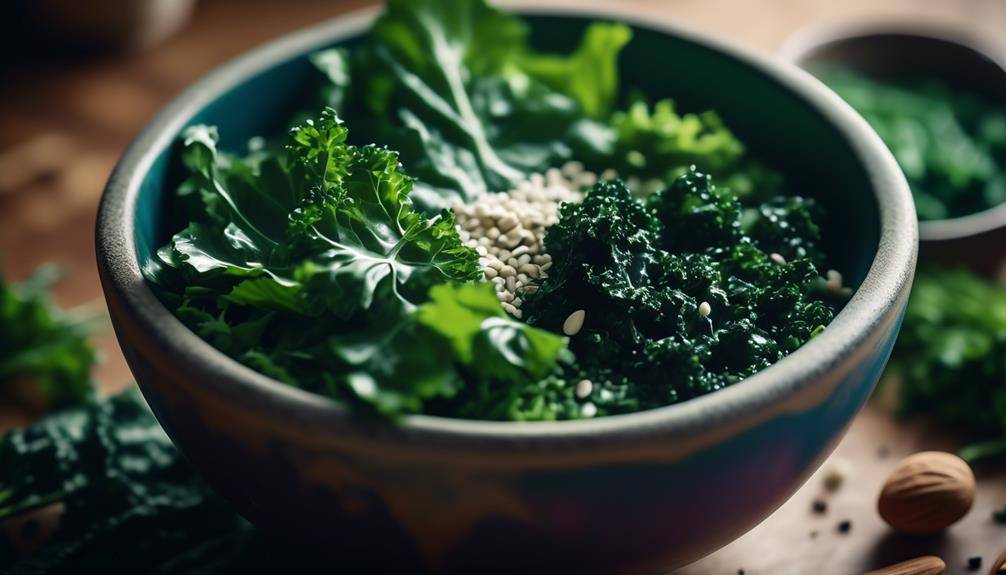The Amazing Calcium Rich Vegan Foods

Calcium Rich Vegan Foods; When you think of a vegan diet, you might not immediately associate it with calcium-rich foods. However, the world of plant-based nutrition is full of surprises. From leafy greens that pack a powerful calcium punch to fortified plant milks that offer a glassful of this essential mineral, there are plenty of options for vegans to meet their calcium needs. But that’s not all – there are other surprising sources of calcium that you may not have considered. So, if you’re curious to discover these hidden gems and boost your calcium intake, keep reading to uncover the secrets of calcium-rich vegan foods.
The Importance of Calcium for Vegans
As a vegan, it is crucial for you to understand the importance of calcium in your diet. Calcium plays a vital role in maintaining strong bones and teeth, as well as supporting proper nerve and muscle function. Without an adequate intake of calcium, vegans may be at risk of calcium deficiency, which can lead to health issues such as osteoporosis and weakened bone density.
One of the concerns for vegans is the absorption of calcium in the body. Plant-based sources of calcium, such as leafy greens, legumes, nuts, and seeds, contain a form of calcium that is less easily absorbed by the body compared to the calcium found in dairy products. However, there are ways to enhance calcium absorption and ensure you meet your daily requirements.
Firstly, it is important to consume a variety of calcium-rich foods throughout the day. By incorporating a range of plant-based sources, you can increase the likelihood of meeting your calcium needs. Additionally, consuming foods that are fortified with calcium, such as plant-based milks and cereals, can help boost your intake.
Furthermore, vitamin D plays a crucial role in calcium absorption. As a vegan, it is important to ensure you are getting enough vitamin D through sunlight exposure or fortified foods. Vitamin D helps the body absorb and utilize calcium effectively.
Leafy Greens: A Calcium Powerhouse
Now let’s talk about leafy greens, which are a true powerhouse when it comes to calcium. These nutrient-packed greens, such as kale, spinach, and collard greens, are not only delicious but also provide a significant amount of calcium per serving. To ensure optimal calcium absorption from these leafy greens, it’s important to pair them with sources of vitamin D, such as fortified plant-based milks or a little bit of sun exposure.
Nutrient-Packed Greens
Leafy greens are an excellent source of calcium, making them a nutrient-packed option for vegans. Not only are they rich in calcium, but they also provide other essential nutrients that contribute to overall health. Leafy greens like kale, collard greens, and spinach are low in calories and high in fiber, vitamins A, C, and K, and minerals like iron and magnesium. These nutrients play a crucial role in maintaining bone health, supporting immune function, and promoting healthy digestion.
To maximize nutrient absorption, it is recommended to consume leafy greens in combination with foods rich in vitamin C, such as citrus fruits or tomatoes. You can also incorporate leafy greens into calcium-rich smoothies by blending them with fortified plant-based milk and adding other fruits for a delicious and nutritious drink.
Calcium Absorption Tips
Looking to enhance your calcium absorption? Discover the powerhouse of calcium found in leafy greens. Leafy greens, such as kale, spinach, and collard greens, are not only packed with essential nutrients, but they are also excellent sources of calcium. To optimize calcium absorption from these plant-based sources, there are a few techniques you can follow. First, pairing leafy greens with foods rich in vitamin D, such as fortified plant-based milks or tofu, can enhance calcium absorption.
Additionally, cooking leafy greens can make the calcium more bioavailable. Steaming or sautéing them can help break down oxalates, which can inhibit calcium absorption. Lastly, if you find it challenging to meet your calcium needs through food alone, there are vegan-friendly calcium supplements available that can help ensure you’re getting enough of this vital mineral.
Fortified Plant Milks: Calcium in a Glass
Looking for a vegan-friendly source of calcium? Fortified plant milks may be just what you need. These milk alternatives are often enriched with calcium to provide a comparable amount to dairy milk. From almond to soy to oat milk, there are plenty of options to choose from, making it easy to incorporate calcium-rich plant-based drinks into your diet.
Milk Alternatives for Calcium
Fortified plant milks offer a glassful of calcium, making them a great alternative to dairy milk for meeting your calcium needs. These milk alternatives are not only suitable for vegans but also for those looking to reduce their dairy intake. Here are three options for milk alternatives rich in calcium:
- Almond Milk: Fortified almond milk provides about 45-50% of your daily calcium needs in just one cup. It is also low in calories and a good source of vitamin E.
- Soy Milk: With approximately 30-35% of your daily calcium requirements per cup, fortified soy milk is another excellent choice. It is also rich in protein and contains less saturated fat compared to dairy milk.
- Oat Milk: Fortified oat milk is a creamy and delicious option that offers around 35-40% of your daily calcium needs per cup. It is also high in fiber and contains beta-glucan, which has been associated with heart health.
Incorporating these milk alternatives into your diet can help ensure you maintain strong bones and prevent conditions such as osteoporosis. Try adding them to your favorite calcium-rich smoothie recipes for a healthy and nutritious beverage.
Fortified Plant-Based Drinks
To further explore the topic of fortified plant-based drinks, let’s now shift our focus to the calcium-rich options available in a glass. Fortified soy beverages and calcium fortified almond milk are excellent choices for those following a vegan diet and looking to increase their calcium intake. Fortified soy beverages are made from soybeans and contain added calcium to provide a similar amount as cow’s milk. They are also a good source of protein and other essential nutrients.
Calcium fortified almond milk, made from almonds and fortified with calcium, is another great option. It is low in calories and fat, making it a healthy choice for those watching their weight. Both fortified soy beverages and calcium fortified almond milk offer a convenient and tasty way to meet your calcium needs while following a vegan lifestyle.
Vegan-Friendly Calcium Sources
Are you wondering how to get enough calcium on a vegan diet? Don’t worry, there are plenty of vegan-friendly calcium sources available to meet your dietary needs. Here are three options to consider:
- Fortified plant milks: Many plant-based milks, such as almond, soy, and oat milk, are fortified with calcium. Check the labels to ensure they contain at least 120 milligrams of calcium per 100 milliliters.
- Vegan calcium supplements: If you’re finding it challenging to meet your calcium requirements through food alone, you can opt for vegan calcium supplements. These supplements are specifically formulated to provide the recommended daily intake of calcium.
- Calcium in nuts: Nuts like almonds, Brazil nuts, and hazelnuts are naturally rich in calcium. Snacking on a handful of these nuts can help boost your calcium intake.
Tofu: A Versatile Calcium Source
Tofu, a versatile plant-based protein, offers a rich source of calcium for those following a vegan diet. Not only is tofu a great source of protein, but it is also an excellent way to increase your calcium intake without consuming animal products. Tofu is made from soybeans and is commonly used in various cuisines worldwide. It is known for its ability to absorb flavors, making it a fantastic ingredient in many dishes.
When it comes to tofu recipes, the possibilities are endless. From stir-fries to scrambles, soups to salads, tofu can be incorporated into a wide range of meals. Try marinating tofu in a mixture of soy sauce, ginger, and garlic, then grilling or baking it for a flavorful and protein-packed main course. For a quick and easy breakfast option, scramble tofu with your favorite vegetables and spices for a delicious plant-based alternative to scrambled eggs.
Besides its versatility in cooking, tofu also provides several health benefits. Apart from being a rich source of calcium, tofu is low in saturated fat and contains no cholesterol. It is also a good source of iron, magnesium, and phosphorus. Additionally, tofu is packed with plant compounds called isoflavones, which have been shown to have antioxidant and anti-inflammatory properties.
To incorporate tofu into your diet, it is important to choose the right type. Opt for calcium-set tofu, as it is prepared using calcium salts, resulting in a higher calcium content. It is readily available in most grocery stores and can be found in both soft and firm varieties.
Sesame Seeds: Tiny but Mighty in Calcium
Sesame seeds, often overlooked but packed with nutritional benefits, are a tiny yet mighty source of calcium that can be easily incorporated into a vegan diet. Don’t underestimate these tiny seeds, as they offer a range of health benefits. Here are three ways you can incorporate sesame seeds into your vegan meals:
- Sprinkle them on salads: Adding a tablespoon of sesame seeds to your salad not only adds a delightful crunch but also boosts its calcium content. In fact, just one tablespoon of sesame seeds provides approximately 9% of the daily recommended intake of calcium. So, next time you’re preparing a salad, don’t forget to sprinkle some sesame seeds on top.
- Use them as a topping: Sesame seeds can be used as a topping on various dishes, such as roasted vegetables, stir-fries, or even avocado toast. By incorporating sesame seeds into your meals, you not only enhance their flavor and texture but also increase their nutritional value.
- Make tahini: Tahini, a paste made from sesame seeds, is a versatile ingredient that can be used in a variety of vegan recipes. From dressings and dips to sauces and spreads, tahini adds a creamy and nutty flavor to your dishes while providing a good amount of calcium. Additionally, tahini is also a good source of healthy fats and protein.
Incorporating sesame seeds into your vegan meals is an excellent way to boost your calcium intake. Whether you choose to sprinkle them on salads, use them as a topping, or make tahini, these tiny seeds offer a powerful punch of nutrients. So, don’t overlook the mightiness of sesame seeds and start incorporating them into your vegan diet today.
Beans and Legumes: Plant-Based Calcium Boosters
Beans and legumes are excellent sources of plant-based calcium that can be easily incorporated into a vegan diet. These nutrient-rich foods not only provide a substantial amount of calcium but also offer other health benefits.
Beans and legumes are not only packed with plant-based protein, but they also contain significant amounts of calcium. For example, one cup of cooked black beans contains about 120 milligrams of calcium, which is equivalent to 12% of the recommended daily intake for adults. Similarly, one cup of cooked lentils provides around 38 milligrams of calcium, contributing to 4% of the daily requirement. Incorporating these foods into your meals can help you meet your calcium needs while following a vegan diet.
In addition to being a good source of calcium, beans and legumes offer numerous other benefits. They are rich in fiber, which aids in digestion and promotes a healthy gut. The high fiber content also helps regulate blood sugar levels and promotes satiety, making these foods a great choice for weight management. Furthermore, beans and legumes are low in fat and cholesterol-free, making them heart-healthy options.
Almonds: Crunchy and Calcium-Rich
If you’re looking to add more plant-based calcium to your vegan diet, almonds are a crunchy and calcium-rich option to consider. Incorporating almonds into your meals can provide numerous benefits for your health. Here are three reasons why you should include almonds in your vegan diet:
- Excellent Source of Calcium: Almonds are packed with calcium, making them a great addition to any vegan diet. Just one ounce of almonds contains about 75 milligrams of calcium, which is approximately 8% of the daily recommended intake for adults. Calcium is essential for maintaining strong bones and teeth, as well as supporting proper muscle function and nerve transmission.
- Heart-Healthy Fats: Almonds are rich in heart-healthy monounsaturated fats, which have been shown to help lower bad cholesterol levels and reduce the risk of heart disease. Including almonds in your vegan meals can provide a good source of these beneficial fats, promoting cardiovascular health and overall well-being.
- Versatile and Delicious: Almonds are incredibly versatile and can be enjoyed in various ways. You can snack on them raw, add them to your morning cereal or oatmeal, blend them into creamy almond butter, or use them as a topping for salads or stir-fries. Their crunchy texture and nutty flavor make them a delicious and satisfying addition to any vegan meal.
Incorporating almonds into your vegan meals is a simple and effective way to boost your calcium intake and enjoy their numerous health benefits. So, why not grab a handful of almonds and start reaping the rewards of this nutritious and tasty nut today?
Oranges: A Citrus Twist to Your Calcium Intake
Oranges add a citrus twist to your vegan diet while providing a boost of calcium. These juicy fruits are not only delicious but also packed with essential nutrients. Although not commonly known for their calcium content, oranges can contribute to your overall calcium intake. In addition to being a good source of vitamin C, oranges contain small amounts of calcium, which can contribute to meeting your daily requirements.
While citrus fruits like oranges are not typically considered high in calcium compared to other plant-based sources, they can still provide a valuable contribution. A medium-sized orange contains approximately 52 milligrams of calcium, which is about 5% of the recommended daily intake for adults. While this may not sound like much, every little bit adds up, especially when combined with other calcium-rich foods.
Apart from their calcium content, oranges are also an excellent source of vitamin C. One medium-sized orange can provide you with around 70 milligrams of vitamin C, meeting more than 90% of the recommended daily intake. Vitamin C is an essential nutrient that plays a critical role in immune function, collagen synthesis, and the absorption of iron.
To incorporate oranges into your vegan diet, you can enjoy them as a snack, make fresh orange juice, or use them as a flavor enhancer in your dishes. Remember to consume a variety of calcium-rich foods, including other plant-based sources like leafy greens, tofu, and fortified plant-based milk, to meet your daily calcium needs.
Chia Seeds: Calcium From Nature’s Superfood
Chia seeds, a powerhouse of nutrients, offer a rich source of calcium for your vegan diet. These tiny seeds pack a big punch when it comes to essential minerals, and calcium is no exception. Incorporating chia seeds into your daily diet can be a simple and delicious way to increase your calcium intake. Here are three ways to enjoy the benefits of chia seeds:
- Chia Pudding: This creamy and indulgent treat is not only delicious but also a fantastic source of calcium. Simply mix chia seeds with your favorite plant-based milk and let them sit overnight. In the morning, you’ll have a thick and nutritious pudding that can be enjoyed as a breakfast or dessert. Get creative by adding fruits, nuts, or spices to enhance the flavor.
- Chia Smoothies: Boost the calcium content of your favorite smoothie by adding a spoonful of chia seeds. These little seeds blend seamlessly into your drink, adding a dose of calcium and a subtle crunch. Try blending them with fruits like bananas, berries, or mangoes for a refreshing and nutritious beverage.
- Chia Energy Bars: Whip up homemade energy bars by combining chia seeds with other nutrient-dense ingredients like nuts, dates, and oats. These bars make for a convenient snack that you can enjoy on the go while providing you with a calcium boost. There are plenty of chia seed recipes available online to inspire your culinary adventures.
Incorporating chia seeds into your daily diet is an excellent way to ensure you’re meeting your calcium needs on a vegan diet. Whether you enjoy them in chia pudding, smoothies, or energy bars, these versatile seeds offer a natural and delicious way to increase your calcium intake.
Seaweed: A Sea of Calcium Opportunities
When it comes to finding vegan foods rich in calcium, chia seeds are just the beginning. Another excellent source of calcium that often goes unnoticed is seaweed. Yes, that’s right, seaweed! This ocean vegetable is not only low in calories but also packed with essential nutrients, including calcium.
Seaweed is known for its high calcium content, making it an ideal addition to a vegan diet. Just 100 grams of dried seaweed can provide up to 1,000 milligrams of calcium, which is more than the recommended daily intake for adults. This means that incorporating seaweed into your meals can help you meet your calcium needs without relying solely on dairy products.
Apart from its calcium content, seaweed offers numerous other benefits. It is rich in iodine, a mineral essential for maintaining proper thyroid function. It is also a good source of vitamins A, C, and E, as well as iron and magnesium. Additionally, seaweed contains antioxidants that can help protect against oxidative stress and inflammation.
Now that you know the benefits of seaweed, let’s explore some delicious seaweed recipes that you can try. One popular option is seaweed salad, which combines different varieties of seaweed with a tangy dressing. Another tasty choice is sushi rolls, where seaweed wraps are filled with vegetables and rice. You can also incorporate seaweed into soups, stews, and stir-fries for an added nutritional boost.
Calcium-Rich Vegan Recipes to Try Today
To incorporate more calcium into your vegan diet, try these delicious and nutrient-rich recipes. Here are three calcium-rich vegan recipes that you can try today:
- Kale and Almond Smoothie: Blend together a handful of kale, a banana, a cup of almond milk, and a tablespoon of almond butter. Kale is an excellent source of calcium, providing about 9% of the daily recommended intake per cup. Almonds and almond butter also contribute to the calcium content of this smoothie, making it a tasty and nutritious way to boost your calcium intake.
- Tofu Scramble: Heat a tablespoon of olive oil in a pan and add crumbled tofu. Season with turmeric, garlic powder, and nutritional yeast for a flavorful twist. Tofu is a great source of calcium, providing about 20% of the daily recommended intake per cup. Pair this tofu scramble with some whole wheat toast for a calcium-rich breakfast or brunch option.
- Chia Pudding: Combine two tablespoons of chia seeds with your choice of plant-based milk, such as almond or coconut milk. Let the mixture sit in the refrigerator overnight to allow the chia seeds to absorb the liquid and create a pudding-like consistency. Chia seeds are packed with calcium, offering about 18% of the daily recommended intake per ounce. Top your chia pudding with fresh fruits or nuts for added flavor and texture.
Calcium Rich Vegan Foods; Frequently Asked Questions
How Much Calcium Do Vegans Need Compared to Non-Vegans?
You need to know how much calcium vegans require compared to non-vegans. It’s important because vegan diets may have lower calcium intake and absorption. Consider incorporating vegan calcium supplements to meet your calcium needs.
Can Calcium From Plant-Based Sources Be Easily Absorbed by the Body?
Yes, calcium from plant-based sources can be easily absorbed by the body. The absorption may vary among different age groups, and cooking methods can also impact calcium absorption.
Are There Any Calcium-Rich Vegan Foods That Are Also Low in Oxalates?
To maximize calcium absorption in vegans and find low oxalate options, focus on foods like tofu, fortified plant-based milk, leafy greens, and almonds. Pairing them with vitamin D and calcium-rich foods can further enhance absorption.
Can a Vegan Diet Provide Enough Calcium for Children and Teenagers?
A vegan diet can provide enough calcium for children and teenagers. Vegan calcium supplements are available for them, and fortified plant-based milks play a role in meeting their calcium needs.
Are There Any Specific Combinations of Plant-Based Foods That Can Optimize Calcium Absorption?
To optimize calcium absorption on a plant-based diet, try combining plant-based calcium sources like tofu, kale, and almonds with foods high in vitamin D, such as fortified plant-based milk. Vegan calcium supplements can also be an option.
Conclusion
In conclusion, incorporating calcium-rich vegan foods into your diet is essential for maintaining strong bones and overall health. Leafy greens, fortified plant milks, tofu, sesame seeds, oranges, chia seeds, and seaweed are all excellent sources of calcium. By including these foods in your meals, you can meet your calcium needs while following a vegan lifestyle. Don’t hesitate to try out some of the calcium-rich vegan recipes mentioned in this article to boost your calcium intake even further.








